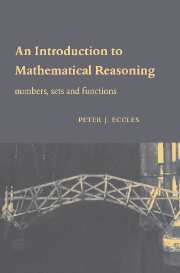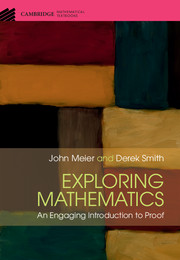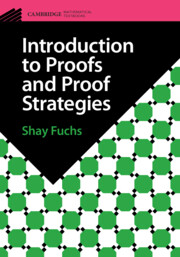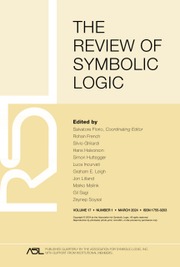An Introduction to Mathematical Reasoning
The purpose of this book is to introduce the basic ideas of mathematical proof to students embarking on university mathematics. The emphasis is on helping the reader in understanding and constructing proofs and writing clear mathematics. This is achieved by exploring set theory, combinatorics and number theory, topics which include many fundamental ideas which are part of the tool kit of any mathematician. This material illustrates how familiar ideas can be formulated rigorously, provides examples demonstrating a wide range of basic methods of proof, and includes some of the classic proofs. The book presents mathematics as a continually developing subject. Material meeting the needs of readers from a wide range of backgrounds is included. Over 250 problems include questions to interest and challenge the most able student as well as plenty of routine exercises to help familiarize the reader with the basic ideas.
- Provides an introduction to the key notion of mathematical proof
- Fully class-tested by the author
- Makes use of a large number of fully worked examples
Reviews & endorsements
'The book is written with understanding of the needs of students …' European Mathematical Society
Product details
December 1997Paperback
9780521597180
361 pages
228 × 153 × 21 mm
0.46kg
Available
Table of Contents
- Part I. Mathematical Statements and Proofs:
- 1. The language of mathematics
- 2. Implications
- 3. Proofs
- 4. Proof by contradiction
- 5. The induction principle
- Part II. Sets and Functions:
- 6. The language of set theory
- 7. Quantifiers
- 8. Functions
- 9. Injections, surjections and bijections
- Part III. Numbers and Counting:
- 10. Counting
- 11. Properties of finite sets
- 12. Counting functions and subsets
- 13. Number systems
- 14. Counting infinite sets
- Part IV. Arithmetic:
- 15. The division theorem
- 16. The Euclidean algorithm
- 17. Consequences of the Euclidean algorithm
- 18. Linear diophantine equations
- Part V. Modular Arithmetic:
- 19. Congruences of integers
- 20. Linear congruences
- 21. Congruence classes and the arithmetic of remainders
- 22. Partitions and equivalence relations
- Part VI. Prime Numbers:
- 23. The sequence of prime numbers
- 24. Congruence modulo a prime
- Solutions to exercises.





